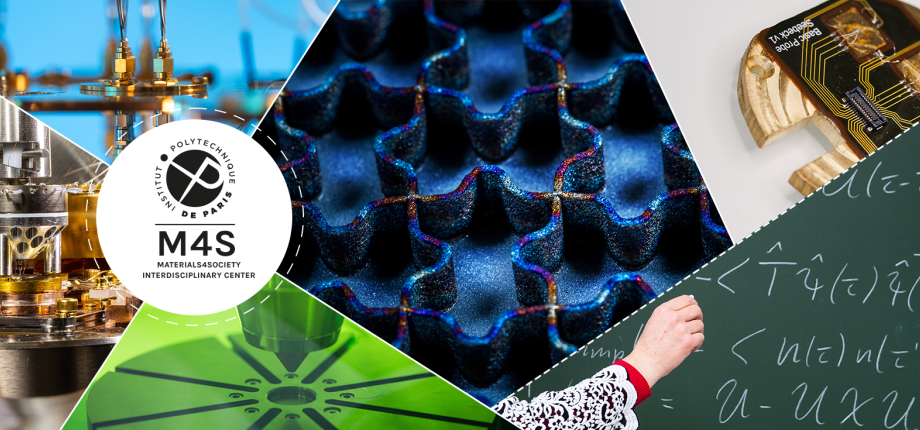M4S - Interdisciplinary Center Materials for Society

Materials science is crucial for technological breakthroughs of our society. It also addresses vital concerns like national sovereignty and eco-responsibility, making research in this field incredibly important.
Materials' multidisciplinary nature aligns perfectly with IP Paris’s research strategy. Launched in 2023, the interdisciplinary center Materials for Society (M4S) at the Institut Polytechnique de Paris aims to advance materials science and use this expertise to tackle major societal challenges related to the field.
Among the research and innovation priorities identified in 2024 by the European Commission, M4S is positioned on four major application themes:
- materials for the ecological transition
- materials for mobility
- materials for construction
- materials for technologies of the future
In each of these areas, M4S distinguishes itself through its holistic approach to materials science, covering the complete path from material design, manufacture, shaping, characterization, and modeling to functionality, including crucial aspects like substitution, durability, recyclability, and recycling.
- 6 IP Paris engineering schools
- 4 IP Paris departments
- 15 laboratories
- 100 researchers and support staff
- 8 scientific and technological platforms
M4S research is organized around three axes. They are based on internationnally recognized competences in simulation, with possible applications on accelerated materials discovery (with close links between theory and experiment), and in instrumentation/characterization, thanks to several state-of-the-art instrumental platforms.
Active materials
The field of active materials refers to all materials and devices whose properties can be modulated by an external stimulus: electric or magnetic field, light irradiation, temperature, pressure, interactions with the environment (humidity, chemistry...). Research in this field can be very fundamental (eg: understanding the effects of chemical pressure on the properties of correlated materials), but also applied (developing sensors for the IoT, real-time monitoring of water quality, biomedical diagnostic tools, etc). This also applies to energy conversion, water electrolysis, monitoring the environmental quality of sites or the performance of infrastructures, etc.
Engineered materials
Engineered materials are materials or combinations of materials, with periodic or random structuring, specific to the target application. This structuration can have variable characteristic dimensions, from the nanometer to the meter, with "hierarchical" engineering to exploit or optimize one or more properties. Research at M4S in this field covers the study of low-dimensional materials (to exploit specific electronic properties for applications such as sensors, opto-electronics ans photovoltaics), multiphysics composite materials (magneto-rheological materials, etc.) and structural materials for mobility, housing and civil engineering, optimized for mechanical, thermal or hydric performance, for example, with regard to environmental issues. In these areas, the use of innovative manufacturing processes is a major focus of work, whether via physical thin-film deposition techniques, chemical elaboration, or aditive manufacturing processes.
Quantum materials
Quantum materials refers to materials whose properties are dominated by quantum entanglement or topological effects, as well as to enabling materials for quantum technologies. The latter are studied as paltforms for controlling individual quantum objects, while the former (of variable dimensionality) are most often characterized by exotic electronic behaviors giving rise to emergent collective properties.
Examples include superconductivity, metal-insulators transitions – or, more generally, unconventional electrictal, thermal or thermoelectric transport properties – but also the mergence of ordered phases involving spin, charge or orbital degrees fo freedom. One such example are spintronic materials featuring complex magnetic orders and couplings between different degrees fo freedom.
The challenge of this field – which M4S intends to tackle – range from the fundamental understanding of quantum mechanical interacting many-body systems and the development of methodologies for tackling them, to concrete applications (information technology, generation of strong magnetic fields for medical applications or fusion science, ultrasensitive probes, etc.).
PhD Track : Phd Track in Advanced Materials
Executive team
- Silke Biermann, co-scientific director
- Andrei Constantinescu, co-scientific director
- Thierry Gacoin, co-scientific director
- Anne-Laure Doireau, director of operations
- Mathieu Xémard, M4S and CIEDS project manager
The executive team meets on a weekly basis to drive forward the various actions proposed M4S.
Board
The board is made up of the executive team and one representative from each laboratory involved in materials science. Members meet every two months to discuss the latest news, orientations and strategy of M4S.














